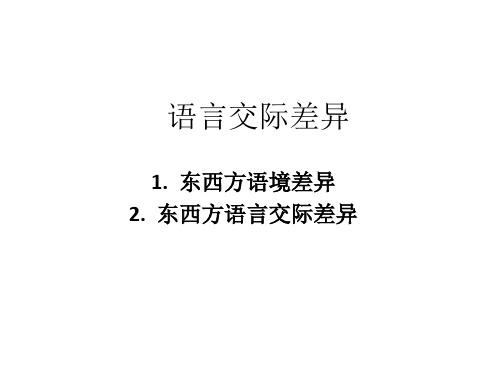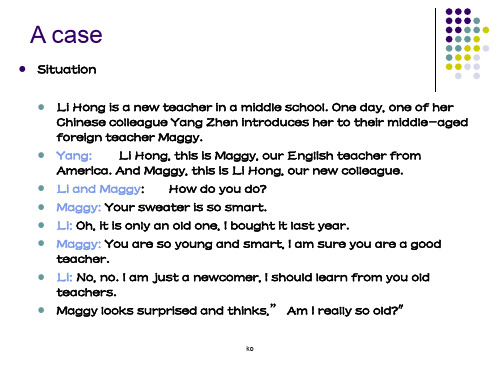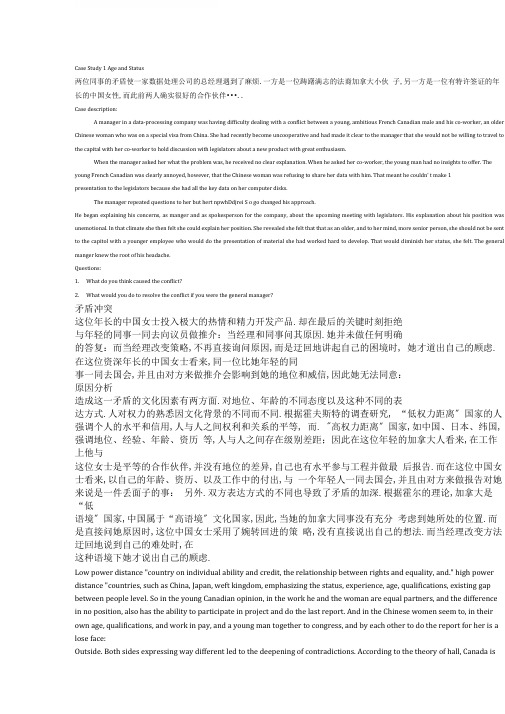跨文化交际案例分析.ppt
跨文化交际 ppt课件

美国人的会话风格
• 其主流语言风格被视为“体谅模式”,主要以 加州为主。
• 另一种语言风格为“参与模式”,以纽约为主 。
交际方式
• 东方人采取单向的保龄球方式。 • 西方人采取的是双向的乒乓球式。
非语言交际差异
非语言交际的定义
• 在交际过程中不是用口头或文字形式进行 信息传递的沟通方式即为非语言交际
• A lucky dog. • As faithful as a dog. 走狗 • Work as hard as a dog. 老黄牛 • 汉语:狗急跳墙,狗血喷头,狗眼看人低,
狗拿耗子多管闲事,狗嘴里吐不出象牙。狗 咬吕洞宾,不识好人心。
(美国)象征着死亡,祭奠亡灵和扫墓时 使用,相当于菊花。(主要用于复活节)
讨论: 鱼在英语中的含义?
• Fish in the air • 水中捞月 • A poor fish • 可怜虫 • A loose fish • 放荡不羁者 • A small fish
颜色词的文化差异,如红色、白色和黄色。 • 红色:happy, health,luck. 红对联、红包、红
3. What’s up? Can’t complain./Same as usual.
2. 东西方称呼语差异
• 东方人在称呼上更强调地位、辈份和身份。 • 西方人则更突出性别和婚姻。 • 东方人通常将姓氏放在名字的前面。 • 亚洲许多国家例如中国、韩国、越南,女
性婚后一般不随夫姓。
• 西方人大多习惯将名字放在姓氏之前,在 西方文化中,女人结婚后要随其丈夫的姓 氏。
• 这一部分需要大家课后去搜索:请找出尽 可能多的手势差异,如ok的手势语,竖起 大拇指的手势语等。
跨文化交际障碍
跨文化交际ppt课件

•
•
中国人认为“六”是最吉利的数字。中国古时就有崇尚“六”的传统 观念。如先秦时期六部儒家经典称为“六经”或“六艺”,诸子百家 中最著名的阴、阳、儒、明、法、道的总称为“六家”,周代兵书现 存六卷称为“六韬”,政区分为“六乡”,周礼有“六典”,官制设 有“六部”,朝廷军队统称“六军”或“六师”,皇后寝宫称为“六 宫”;把亲属关系归纳为“六亲”,妇女怀孕称为“身怀六甲”,天 地四方称为“六合”或“六幽”;中医将人的心、肺、肝、肾、脾、 胆称为“六府”,佛教认为凡人有“六情”。民间也有“六六大顺”、 “六畜兴旺”、“眼观六路,耳听八方”的俗语。“六”在中国人看 来是个最吉利不过的数字:农历初六、十六、二十六被视为举行婚礼 的黄道吉日。在使用电话号码或车牌号时,人们尤其钟爱尾数为 “66”、“666”、“666”这几组数字,因为它们象征着顺顺利利,万 事如意。 然而,“six”在英语中却是一个不受欢迎的数字。人是在第六天被创 造出来的,还有许多缺点,所以我们要和上帝呆在一起,才能洗尽身 上的罪恶。我们来看看下面的习语即可了解:at sixes and sevens (七上八下,乱七八糟;迷糊的);hit/knock sb. for six(给某人 以毁灭性的打击);six to one(相差悬殊);six of the best(以 藤鞭击六下———学校的一种惩罚手段);six penny(不值钱); six of one and half a dozen of the other(半斤八两,差不多); six of one and half a dozen of the other(五十步笑百步)。还 有谚语:“If you have done no ill the six days,you may play the seventh.”(好好干六天,尽情玩一天。)
跨文化交际PPT演示课件

3. Space and Distance
3.1 Proxemics 3.2 Attitudes Toward Crowding
24
3.1 Proxemics
✓ Definition: the study of people’s perception and use of space.
✓ Four categories: intimate, personal, social, and public distance.
26
Categories of Distance (cont’d)
• Social Distance (1.3-3m) - colleagues, business partners, people at social gatherings
• Public Distance (beyond 3m) - speaking in public
- direct intrusion into others’ affairs • Shrugging shoulders
- indifferent, powerless, having no secret to conceal
19
Postures (cont’d)
• Follow one’s natural habits so often go unnoticed (subconscious in nature)
• May damage your image if you neglect your postures
20
2.4 Eye Contact
Direct eye contact • Chinese: avoid • North Americans: appreciate • The British: avoid
跨文化交际案例分析(共7个)

《跨文化交际学概论》第七章社会交往五、宴请招待p132Case One: Setting Rules for a Guest – American Hospitality案例:When Zhang Tao traveled in America, he lived in the home of his American friend, Bill. Once after he had traveled back, he found Bill was in a bad mood. When he asked what the problem was, Bill told Zhang Tao that his son Adam got furious about the noise Zhang made when walking upstairs and also because he was using too much water in the solar powered shower and Adam had to have his shower in cold water. Bill told Zhang Tao that he should walk more softly in future, and have a fast shower to save water. Zhang Tao felt uneasy. How could the host set such rules for his guest!Question: Why did Zhang Tao feel uneasy?分析:1) In China, when people host someone, they put the guest in the place of honor to show hospitality. They try to take care of the guest,and try to make the guest feel comfortable and at ease.2) In America, people tend to give the guest great freedom and treat a guest more casually, naturally and truthfully.3) Zhang Tao knew he was a guest, and thought in terms of Chinese expectations of hospitality. He thought Bill should treat him courteously instead of setting rules for him.4) Since Zhang Tao lived in American surroundings, he should have known about the customs there sooner.Case Two:案例:Lin had traveled 20 hours from Beijing to New York. He needed a good meal. His American friend, Mike, met him. But Mike only offered him a plate of roasted chicken and a glass of orange juice. Lin was used to having a main course, and asked Mike if he had any rice. Mike said he only had fried noodles, and Lin had to make do with it. Though Lin knew Americans didn’t care very much about what food they ate, he still felt surprised because he had taken Mike to the most famous duck restaurant in Beijing -- Quanjude -- when he arrived in Beijing.Question: Why did Lin feel surprised? Offer some advice to him about adjusting to his new environment in America.分析:1) 0n the topic of hospitality, the Chinese stress on warmth and demonstrating friendship. They take the guest to a famous or luxurious restaurant to have a very good (expensive) meal to show their hospitality. And the Chinese are used to having a big meal. The more dishes they put out,the greater the warmth and friendship they show.2) In western countries, people stress on freedom. They give the guest great freedom to choose their own foods. And westerners tend to have only one main course and some juice or dessert,which is viewed as casual in the eyes of the Chinese.3) Lin lived in American surroundings and should have adjusted himself quickly to the new world (lifestyle). He should have known the custom there first, and felt more at ease in Mike’s h ome.Case Three: Equality or Hospitality for Table Manners案例:Lin Hua has accompanied an American delegation to visit China. They have experienced the hospitality of the Chinese people. After returning to America, Linhua once visited them. They were so glad to meet again. Linhua offered to host the meal, but they refused. They ordered their own dish, and Linhua ordered her own. When footing the bill, they only paid their part,and no one wanted to pay for Linhua. Linhua found them so inhospitable, though she knew the Americans would usually pay for their own food.Question: Why did Linhua find them inhospitable?分析:1) In China, to show hospitality, people tend to host the meal. And if they cannot do this, they at least will struggle to pay for the guest.2) In America, people tend to pay for themselves to show equality and independence.3) Linhua knows this custom, but from a Chinese point of view, she still finds this hard to accept, and feels it a little inhospitable.Case Four:案例:I have an American friend. I have invited him several times, and at long last he invited me to his home one day. He told me to get there at 3 p m. I thought we could chat and have a meal together. I gave him a Chinese calendar, a woman’s scarf and a bottle of Chinese white wine. He only took out a dish of nuts, a plate of bread and a bottle of wine. After two hours’ chat, I found there was no hint of a meal and said good-bye to him. He only gave me a box of chocolate as a present for the New Year. After I got home, I found the box already been opened. I was very surprised, Question: What surprised me?分析:1) In China, a visit to home always includes a meal. And the guest always bringsa relatively expensive present to the host. And the present should be well wrapped or untouched.2) In the west, a visit to home only means a meeting, not necessarily including a meal. And the present is treated not as importantly as it is in China.3) I acted in a way that was based on Chinese customs, so I felt the American way was very interesting (unusual).Case Five: Way of Entertaining Guests in China ---- Drink more and more案例:Tom, an American, went to a Chinese home for the first time. He was offered some tea. Just when the first cup was about to finish, more tea was added. He drank the second cup. Then the cup was filled the third time. Then he drank it, then ⋯ until he was quite full. Tom was totally confused by the way of entertaining.Question: Why was Tom totally confused?分析:1) Traditional Chinese custom requires that during the course of entertaining, the host has to always pour more wine or tea to the guest’s glass or cup, and always adds more food to the guest’s plate or bowl without asking whether it’s wanted.2) Chinese guests know how to respond to this type of hospitality. They simply leave the wine, tea, or food in the container and stop having any more. But Tom, the American guest in the case didn’t know this.3) He followed the politeness rule of his culture: it’s not good manners to leave food in one’s own plate at a dinner table. Therefore, without any knowledge of the differences between the two cultures, an American guest would very likely suffer from either drinking or eating too much in such a situation.Case SixAs a foreign student at the University of Wisconsin in Madison, Keiko Ihara (Japanese) was on a strict budget. She had all her tuition and books paid for by scholarships and grants and until recently was comfortably housed in the dormitory. Wanting to live in the community rather than in the dormitory, she found a small apartment to share with a friend. Her college friends, knowing of her situation, offered to round up some of the necessary items for apartment living. Keiko politely declined, saying she could manage. Wanting to help out her friends found some old but still usable household appliances and furniture. Mary had an old desk that was in hergarage. Ed had some chairs from his uncle, and Joe and Marion had a few extra dishes. They cheerfully brought them over one day. Keiko seemed very embarrassed, but gracefully accepted them, sincerely and profusely thanked them.The following week they were each presented with a gift from Keiko. Mary got an ornate jewelry box, Ed a volume of woodcuts by a famous Japanese artist, and Joe and Marion a beautiful Japanese vase, all of which were of considerable worth and value, much more than the old things they had donated to her. They all protested that she could not afford to give such elaborate gifts; they really expected nothing as the household items were not really being used and they would rather have her use them. Keiko, however, insisted that they take the gifts. In the end, they accepted the gifts, although they all felt uncomfortable as they knew she was really sacrificing to give them.Questions:1. What do you think of Keiko insisting on giving valuable gifts to her college friends?2. Why did Keiko’s friends feel very uncomfortable when they received valuablegifts in return?分析:Keiko insists on giving valuable gifts to her college friends, because in countries like Japan, exchanging gifts is a strongly rooted social tradition. Should you receive a gift, and don’t have one to offer in return, you will probably create a crisis. If not as serious as a crisis, one who doesn’t offer a gift in return may be considered rude or impolite. Therefore, in Japan, gifts are a symbolic way to show appreciation, respect, gratitude and further relationship.Keiko obviously has taken those used items from Mary, Ed and Marion as gifts, for she probably doesn’t know that Americans frequently donate their used household items to church or to the community. Mary, Ed and Marion would never consider those used household items given to Keiko as gifts. No wonder they felt very uncomfortable when they received valuable gifts in return.Case SevenSelma, who is from the US, is in a student exchange program in Indonesia. One day, she was asked to attend a birthday party and she was delighted, for she was curious to know what an Indonesian birthday party was like. To her surprise, she was the only one that dressed in typically Western clothes. Although she had no strong reason to become uneasy, her uneasy feeling prevailed as the party was going on. To make herself feel better, she went to the food table and began to help herself. But, upon leaving the table, she tripped on the leg of a chair and spilled her drink on the floor. One of the girls stooped down to mop up the spill and everyone else laughed out loud. Selma, uncertain what to do next, quietly moved out of her way with her head lowered in shame.Questions:3. What functions does laughing serve in similar situations in China?4. What should we do to help ourselves or other people out of embarrassmentcaused by cultural differences in laughing?分析:Just like smile, laughing does not always serve the same function in different cultures. Interestingly, for us Chinese, laughing often has a special function on some tense social occasions. People may laugh to release the tension or embarrassment, to express their concern about you, their intention to put you at ease or to help you come out of the embarrassment. In this case, the people there were actually wishing to laugh with the American rather than laugh at her. Their laughing seemed to convey a number of messages: don‘t take it so seriously; laugh it off, it‘s nothing; such things can happen to any of us, etc. Unfortunately the American was unaware of this. She thought they were laughing at her, which made her feel more badly and angry, for in her culture laughing on such an occasion would be interpreted as an insulting response, humiliating and negative.。
跨文化交际案例分析演示

Analysis:
Japan
Exchanging gift is a strongly rooted social tradition. Don't want to owe others. Fear of causing trouble to others.
America
Donating their used household items to church or community frequently.
Group Discussion:
From the case, I think Keiko obviously has taken those used items from Mary, Ed and Marion as gifts. Yes, for Keiko probably doesn't konw that Americans frequently donate their used household items to church or community. Mary, Ed and Marion would never consider those used household items given to Keiko as gifts. No wonder they felt very uncomfortable.
Like helping others without asking for return. Not feel troublesome. Be ready to help others.
Answer:
Q1: What do you think of Keiko insisting on giving valuable gifts to her college friends?
跨文化交际PPT演示文稿

4
第4页,共21页。
euphoria 过度兴奋的情绪
utopia 乌托邦(理想中最完美的地方) ecstasy 狂喜
fantasy 幻想,空想 pervade 蔓延,渗透
scoff at 嘲弄 national 国民
outburst 突发,爆发
expatriate 侨民
vertigo
眩晕
snapshot 快照,快拍
10
第10页,共21页。
11
第11页,共21页。
Four phases of cultural adaptation
Predeparture Stage Before entering the host cultrue, you feel
excited and face the future with optimism. Stage one: everything is beautiful
13
第13页,共21页。
Comprehension question
Question 1: What are the terms that can be applied to the
concept of “culture shock”?
Terms that can be applied to theconcept of―culture shock are culture stress, adaptation, transition shock, adjustment, socialization, and so on.
19
第19页,共21页。
Question 7:
What do you think of the author‟s suggestion of using the native language to compliment people inthe host culture?
跨文化国际交流案例分析PPT课件

what are their taboos.
Finally,The Inner Mongolia company didn't do a
w202e0/1l/l3 reserch on Indian culture. Moreover,
Second, Chinese hosts shoudn't prepare a
2020w/1/3hole
4
Explainations
Third, Chinese take them to local mental hospital
without obtainning Indian agreements, but Indian
company. From this case, we must learn from
that: respect cultural differences, avoid offend
some taboos, more communication with2源自20/1/39each
2020/1/3
10
Hindu, cattle has an great importance on their
heart and they regard it as God. Eating cattle is
their taboo. However, Inner Mogolia mainly eatting cattle and sheep.
2020/1/3
11
2020/1/3
7
Solutions
• For Indian Businessmen:When they come
跨文化交际案例分析

案例三:非语言交际行为的误解
情况描述
在一次国际晚宴中, 一位美国客人和一位 日本客人之间的社交 礼仪产生了差异。美 国客人习惯于直接、 热情的礼仪,而日本 客人则更注重谦虚和 尊重。这导致双方在 晚宴中的互动出现了 尴尬和误解
案例三:非语言交际行为的误解
问题分析
这个案例中的问题主要是由社交礼仪的差异引起的。美 国客人和日本客人的社交礼仪存在明显差异,这种差异 可能导致双方在互动中产生误解和尴尬
案例三:非语言交际行为的误解
解决方案
为了解决这个问题,首先需要认识到这种社 交礼仪的差异,并尊重彼此的礼仪习惯。美 国客人可以尝试更理解日本客人的谦虚和尊 重,而日本客人也可以尽可能适应美国客人 的直接和热情。双方可以通过了解彼此的社 交礼仪,找到一个共同的解决方案,以达到 和谐的互动
PART 4
案例五:食物与文化的关系
4
案例五:食物与文化的关系
情况描述
在一个国际家庭聚会 中,来自不同国家的 亲戚们在一起共享美 食。然而,由于食物 与文化的关系不同, 一些食物在某些国家 是受欢迎的,而在其 他国家却被视为禁忌 。这导致了一些尴尬 和误解
案例五:食物与文化的关系
问题分析
这个案例中的问题主要是由食物与文化的关系引起的。 来自不同国家的亲戚们对食物的认知和文化背景存在差 异,这种差异可能导致在共享美食时产生尴尬和误解
案例一:语言与文化差异的处理
解决方案
为了解决这个问题,首先需要认识到这种语 言与文化差异的存在,并尊重彼此的交际风 格。英国员工可以尝试更能明确表达 自己的意见。此外,双方还可以通过提高彼 此的语言能力,更好地理解和尊重对方的文 化背景
PART 2
案例二:价值观与文化冲突的解决
大学英语跨文化交际案例分析课堂PPT演示样本

Case Three: Cultural Misunderstandings in International Tourism
• Summary: Cultural Misunderstandings in International Tourism
Case Three: Cultural Misunderstandings in International Tourism
• Detailed description • Catering habits: ts from different cultural backgrounds may have
different dining habits and preferences. For example, some cultures may prefer spicy food, while others may place more emphasis on a light and healthy diet. • Etiquette and Customs: During the tourism process, tourists need to understand and abide by local etiquette and customs. For example, in some cultures, touching someone's head or using the left hand is considered impolite and disrespectful behavior. • Language expression: In cross-cultural communication, differences in language expression may lead to misunderstandings and conflicts. For example, some languages may have specific expressions or implicit meanings, which may lead to communication barriers if not understood.
【最新整理】跨文化交际案例分析.ppt

吉尔吉斯斯坦:工具型
2
这位留学生来自吉尔吉斯斯坦,在
他的国家,人与人之间的关系系统
比较简单。与人交往所获利益都是
相互的,如果意见不同或是谈判不
成功他不会考虑今后还会利用这种
人际关系,当他与老师谈论泄露考
题不成时当即就用不敬的言辞断绝
了与老师的利益关系。当他三思厉
1
害关系后又来讨好老师的行为也正 体现了他们所在的文化圈简单的人
一般而言,这类关系 可能包括亲戚、邻居、 熟人,或相处较融洽 的同学、同行、客户, 还可能是交往双方共 同认识的第三者。这 是最典型、最普遍, 最有效的类型
情感型
混合型
特点:非个人化、非 情感化,理智而直率, 表现出不牢固、不稳 定特征
工具型
人际关系比较的取向
中国:情感型、混合型
中国的人际关系像一张网,每个人 都是网上的一个“结”,从一个 “结”出发可有许多条线与其他 “结”相连。每个人在这张网络中 大都处于相同的地位。他会给予别 人恩惠,同时也从别人那里得到恩 惠。在更深和更微妙的层次上“关 系”指的是一种方法,即中国人长 远的利用关系作为一种资源。因此, 中国人在与他人尤其是熟人之间有 分歧时,大家为了维留面子,即不会很 过激。
际关系网。
解决方法
中国教师
• 对于中国教师来讲,首先要做 的就是理解这位留学生给你的 这种行为,要有跨文化交流的 意识与学习有关跨文化交流的 知识,不能以中国人际交往的 方法去严格的要求其他国家的 留学生。比如老师应该理解来 自吉尔吉斯斯坦的学生的人际 交往方式,并且帮助留学生融 入中国,学习中国的交往方法 。2020/6/18
在中国学习的留学生
对于在中国学习的留学生,入乡随俗就很起码 的一点,要了解并理解中国的这种情感为主导 的人际交往方式,与中国人交往的过程中应该 多重视“情义”,比如中国重人情和面子,人 际交往讲究“做人情”、“送人情”、“注重 礼尚往来”、欠情还情”,提倡“滴水之恩, 当涌泉相报”,“为朋友两肋插刀”等,学习 这些人际交往的方法能帮助留学生融入中国的 社会环境。而在跨文化交往中发生冲突的时候 ,也应该理性面对,不是一味的按自己国家的 交往方法作为标准去衡量别的国家。
跨文化交际案例分析(共7个)

《跨文化交际学概论》第七章社会交往五、宴请招待p132Case One: Setting Rules for a Guest – American Hospitality案例:When Zhang Tao traveled in America, he lived in the home of his American friend, Bill. Once after he had traveled back, he found Bill was in a bad mood. When he asked what the problem was, Bill told Zhang Tao that his son Adam got furious about the noise Zhang made when walking upstairs and also because he was using too much water in the solar powered shower and Adam had to have his shower in cold water. Bill told Zhang Tao that he should walk more softly in future, and have a fast shower to save water. Zhang Tao felt uneasy. How could the host set such rules for his guest!Question: Why did Zhang Tao feel uneasy?分析:1) In China, when people host someone, they put the guest in the place of honor to show hospitality. They try to take care of the guest,and try to make the guest feel comfortable and at ease.2) In America, people tend to give the guest great freedom and treat a guest more casually, naturally and truthfully.3) Zhang Tao knew he was a guest, and thought in terms of Chinese expectations of hospitality. He thought Bill should treat him courteously instead of setting rules for him.4) Since Zhang Tao lived in American surroundings, he should have known about the customs there sooner.Case Two:案例:Lin had traveled 20 hours from Beijing to New York. He needed a good meal. His American friend, Mike, met him. But Mike only offered him a plate of roasted chicken and a glass of orange juice. Lin was used to having a main course, and asked Mike if he had any rice. Mike said he only had fried noodles, and Lin had to make do with it. Though Lin knew Americans didn’t care very much about what food they ate, he still felt surprised because he had taken Mike to the most famous duck restaurant in Beijing -- Quanjude -- when he arrived in Beijing.Question: Why did Lin feel surprised? Offer some advice to him about adjusting to his new environment in America.分析:1) 0n the topic of hospitality, the Chinese stress on warmth and demonstrating friendship. They take the guest to a famous or luxurious restaurant to have a very good (expensive) meal to show their hospitality. And the Chinese are used to having a big meal. The more dishes they put out,the greater the warmth and friendship they show.2) In western countries, people stress on freedom. They give the guest great freedom to choose their own foods. And westerners tend to have only one main course and some juice or dessert,which is viewed as casual in the eyes of the Chinese.3) Lin lived in American surroundings and should have adjusted himself quickly to the new world (lifestyle). He should have known the custom there first, and felt more at ease in Mike’s h ome.Case Three: Equality or Hospitality for Table Manners案例:Lin Hua has accompanied an American delegation to visit China. They have experienced the hospitality of the Chinese people. After returning to America, Linhua once visited them. They were so glad to meet again. Linhua offered to host the meal, but they refused. They ordered their own dish, and Linhua ordered her own. When footing the bill, they only paid their part,and no one wanted to pay for Linhua. Linhua found them so inhospitable, though she knew the Americans would usually pay for their own food.Question: Why did Linhua find them inhospitable?分析:1) In China, to show hospitality, people tend to host the meal. And if they cannot do this, they at least will struggle to pay for the guest.2) In America, people tend to pay for themselves to show equality and independence.3) Linhua knows this custom, but from a Chinese point of view, she still finds this hard to accept, and feels it a little inhospitable.Case Four:案例:I have an American friend. I have invited him several times, and at long last he invited me to his home one day. He told me to get there at 3 p m. I thought we could chat and have a meal together. I gave him a Chinese calendar, a woman’s scarf and a bottle of Chinese white wine. He only took out a dish of nuts, a plate of bread and a bottle of wine. After two hours’ chat, I found there was no hint of a meal and said good-bye to him. He only gave me a box of chocolate as a present for the New Year. After I got home, I found the box already been opened. I was very surprised, Question: What surprised me?分析:1) In China, a visit to home always includes a meal. And the guest always bringsa relatively expensive present to the host. And the present should be well wrapped or untouched.2) In the west, a visit to home only means a meeting, not necessarily including a meal. And the present is treated not as importantly as it is in China.3) I acted in a way that was based on Chinese customs, so I felt the American way was very interesting (unusual).Case Five: Way of Entertaining Guests in China ---- Drink more and more案例:Tom, an American, went to a Chinese home for the first time. He was offered some tea. Just when the first cup was about to finish, more tea was added. He drank the second cup. Then the cup was filled the third time. Then he drank it, then ⋯ until he was quite full. Tom was totally confused by the way of entertaining.Question: Why was Tom totally confused?分析:1) Traditional Chinese custom requires that during the course of entertaining, the host has to always pour more wine or tea to the guest’s glass or cup, and always adds more food to the guest’s plate or bowl without asking whether it’s wanted.2) Chinese guests know how to respond to this type of hospitality. They simply leave the wine, tea, or food in the container and stop having any more. But Tom, the American guest in the case didn’t know this.3) He followed the politeness rule of his culture: it’s not good manners to leave food in one’s own plate at a dinner table. Therefore, without any knowledge of the differences between the two cultures, an American guest would very likely suffer from either drinking or eating too much in such a situation.Case SixAs a foreign student at the University of Wisconsin in Madison, Keiko Ihara (Japanese) was on a strict budget. She had all her tuition and books paid for by scholarships and grants and until recently was comfortably housed in the dormitory. Wanting to live in the community rather than in the dormitory, she found a small apartment to share with a friend. Her college friends, knowing of her situation, offered to round up some of the necessary items for apartment living. Keiko politely declined, saying she could manage. Wanting to help out her friends found some old but still usable household appliances and furniture. Mary had an old desk that was in hergarage. Ed had some chairs from his uncle, and Joe and Marion had a few extra dishes. They cheerfully brought them over one day. Keiko seemed very embarrassed, but gracefully accepted them, sincerely and profusely thanked them.The following week they were each presented with a gift from Keiko. Mary got an ornate jewelry box, Ed a volume of woodcuts by a famous Japanese artist, and Joe and Marion a beautiful Japanese vase, all of which were of considerable worth and value, much more than the old things they had donated to her. They all protested that she could not afford to give such elaborate gifts; they really expected nothing as the household items were not really being used and they would rather have her use them. Keiko, however, insisted that they take the gifts. In the end, they accepted the gifts, although they all felt uncomfortable as they knew she was really sacrificing to give them.Questions:1. What do you think of Keiko insisting on giving valuable gifts to her college friends?2. Why did Keiko’s friends feel very uncomfortable when they received valuablegifts in return?分析:Keiko insists on giving valuable gifts to her college friends, because in countries like Japan, exchanging gifts is a strongly rooted social tradition. Should you receive a gift, and don’t have one to offer in return, you will probably create a crisis. If not as serious as a crisis, one who doesn’t offer a gift in return may be considered rude or impolite. Therefore, in Japan, gifts are a symbolic way to show appreciation, respect, gratitude and further relationship.Keiko obviously has taken those used items from Mary, Ed and Marion as gifts, for she probably doesn’t know that Americans frequently donate their used household items to church or to the community. Mary, Ed and Marion would never consider those used household items given to Keiko as gifts. No wonder they felt very uncomfortable when they received valuable gifts in return.Case SevenSelma, who is from the US, is in a student exchange program in Indonesia. One day, she was asked to attend a birthday party and she was delighted, for she was curious to know what an Indonesian birthday party was like. To her surprise, she was the only one that dressed in typically Western clothes. Although she had no strong reason to become uneasy, her uneasy feeling prevailed as the party was going on. To make herself feel better, she went to the food table and began to help herself. But, upon leaving the table, she tripped on the leg of a chair and spilled her drink on the floor. One of the girls stooped down to mop up the spill and everyone else laughed out loud. Selma, uncertain what to do next, quietly moved out of her way with her head lowered in shame.Questions:3. What functions does laughing serve in similar situations in China?4. What should we do to help ourselves or other people out of embarrassmentcaused by cultural differences in laughing?分析:Just like smile, laughing does not always serve the same function in different cultures. Interestingly, for us Chinese, laughing often has a special function on some tense social occasions. People may laugh to release the tension or embarrassment, to express their concern about you, their intention to put you at ease or to help you come out of the embarrassment. In this case, the people there were actually wishing to laugh with the American rather than laugh at her. Their laughing seemed to convey a number of messages: don‘t take it so seriously; laugh it off, it‘s nothing; such things can happen to any of us, etc. Unfortunately the American was unaware of this. She thought they were laughing at her, which made her feel more badly and angry, for in her culture laughing on such an occasion would be interpreted as an insulting response, humiliating and negative.。
跨文化交际案例分析 英文 PPT

Cultural analysis
M-time vs. P-time Future-oriented vs. present-oriented
感谢您的聆听 !
Combine the theory with the
case
Thus, in this case, Koreans tried their best to take the peacemaking approach to de-escalate conflicts, so that harmony between members would be maintained as long as possible. However, Jim, from individualistic culture, considered it strange that his Korean colleagues would rather hide the problems to the last moment than solve the conflicts. In his view, suspending the conflicts wouldn’t release tensions and solidify the relationship but to potentially destruct the relationship.
“If you don’t acknowledge the problems”, he complained to one of the managers, “how do you expect to be able to solve them?” And then to further exasperate him, just today when a problem was finally brought to his attention, it was not mentioned until the end of the workday when there was no time left to solve it.
跨文化交际案例分析演示课件

More exercises
1
Case 1
Jim Ellis, vice president of a North Carolina knitwear manufacturer, was sent by his company to observe firsthand how operations were proceeding in their Korean plant and to help institute some new managerial procedures. Before any changes could be made, however, Jim wanted to learn as much as possible about the problems that existed at the plant.
6
Cultural Analysis
High-context/ low-context culture Individualistic/ collectivistic culture Attitude towards bad news
7
Cultural analysis
In individualistic culture, they view conflict as fundamentally a good thing. Working through conflict can gain new information about members, defuse more serious conflict, and increase group cohesiveness. Individuals should be encouraged to think of creative, even farreaching solutions to conflicts. There is also value in direct confrontation, recognizing conflict and working through it in an open, productive way.
跨文化交际PPT演示课件

.
Key Terms
The Adaptation Stage 适应阶段 适应阶段是指“外乡人”的沮丧、烦恼和焦虑消失了 的阶段。他们基本上适应了新的文化环境,适应了当 地的风俗习惯,能与当地人和平相处。 The Reverse Culture Shock 逆向文化冲击 逆向文化冲击是指归国者归国初期表现出对自己祖国 环境的种种不适应状况。
跨文化交际实训
.
Culture Shock in Intercultural Communication
Learning Objectives In this chapter, you should be able to Basic knowledge about culture shock. The elements that cause culture shock. The five stages of culture shock. How do the people feel and react when they are experiencing culture shock. How to alleviate culture shock.
.
Comprehension Questions
.
Glossary
initial enchantment fascination cordial superficial embrace invariably idiosyncrasies competent overwhelmed adj. 最初的;字首的 n. 魔法;着迷 n. 魅力;入迷 adj. 兴奋的;热忱的 adj. 表面的;肤浅的 vt. 包含;信奉 adv. 不变地;总是 n. 气质;风格 adj. 能干的;足够的 adj. 压倒性的, 无法抵抗的
跨文化交际案例分析PPT课件

.
6
Cultural Analysis
High-context/ low-context culture Individualistic/ collectivistic culture Attitude towards bad news
.
7
Cultural analysis
In individualistic culture, they view conflict as fundamentally a good thing. Working through conflict can gain new information about members, defuse more serious conflict, and increase group cohesiveness. Individuals should be encouraged to think of creative, even farreaching solutions to conflicts. There is also value in direct confrontation, recognizing conflict and working through it in an open, productive way.
2
.
During his first week he was met with bows, polite smiles, and the continual denial of any significant problems. But Jim was enough of a realist to know that he had never heard of any manufacturing operation that didn’t have some problems. So after some research, he uncovered a number of problems that the local manager and staff were not acknowledging. None of the problems were particularly unusual or difficult to solve, but Jim was frustrated that no one would admit that any problems existed.
跨文化交际-案例分析Case-analysis.ppt

teachers. Maggy looks surprised and thinks,” Am I really so old?"
ko
Case analysis: a poor example
ko
Case analysis: a better example
To avoid miscommunication, Li Hong and Maggy should learn more about each other’s culture and adjust their behaviors accordingly. When Maggy complimented Li on her sweater and herself, Li could simply reply “thank you”. She could use her nonverbal language to show her respect to Maggy, for instance, with a smile, a handshake, etc. (2 points) As to Maggy, she could use fewer complimentary words or more objective questions to reduce Li’s nervousness. She should also understand that one of the key values in collectivism is deference paid to experience and old age.
跨文化交际案例分析[优质ppt]
![跨文化交际案例分析[优质ppt]](https://img.taocdn.com/s3/m/65a044773b3567ec112d8a13.png)
Case study
• Typical sections:
– case summary – Cultural reasons – alternatives – conclusion
Suggested answer
Case summary
Jim was sent to Korean plant to help people there with some new managerial procedures, though Jim was welcomed with great hospitality, only to find that his Korean colleagues tried to avoid acknowledging any significant problems, let alone solving them. Jim couldn’t understand the way that Korean solved the problem. To his exasperation, a problem was mentioned when there was no time left to solve it.
During his first week he was met with bows, polite smiles, and the continual denial of any significant problems. But Jim was enough of a realist to know that he had never heard of any manufacturing operation that didn’t have some problems. So after some research, he uncovered a number of problems that the local manager and staff were not acknowledging. None of the problems were particularly unusual or difficult to solve, but Jim was frustrated that no one would admit that any problems existed.
完整版跨文化交际案例分析

Case Study 1 Age and Status两位同事的矛盾使一家数据处理公司的总经理遇到了麻烦.一方是一位踌躇满志的法裔加拿大小伙子,另一方是一位有特许签证的年长的中国女性,而此前两人确实很好的合作伙伴•••..Case description:A manager in a data-processing company was having difficulty dealing with a conflict between a young, ambitious French Canadian male and his co-worker, an older Chinese woman who was on a special visa from China. She had recently become uncooperative and had made it clear to the manager that she would not be willing to travel to the capital with her co-worker to hold discussion with legislators about a new product with great enthusiasm.When the manager asked her what the problem was, he received no clear explanation. When he asked her co-worker, the young man had no insights to offer. The young French Canadian was clearly annoyed, however, that the Chinese woman was refusing to share her data with him. That meant he couldn' t make 1presentation to the legislators because she had all the key data on her computer disks.The manager repeated questions to her but hert npwhDdjrei S o go changed his approach.He began explaining his concerns, as manger and as spokesperson for the company, about the upcoming meeting with legislators. His explanation about his position was unemotional. In that climate she then felt she could explain her position. She revealed she felt that that as an older, and to her mind, more senior person, she should not be sent to the capitol with a younger employee who would do the presentation of material she had worked hard to develop. That would diminish her status, she felt. The general manger knew the root of his headache.Questions:1.What do you think caused the conflict?2.What would you do to resolve the conflict if you were the general manager?矛盾冲突这位年长的中国女士投入极大的热情和精力开发产品.却在最后的关键时刻拒绝与年轻的同事一同去向议员做推介:当经理和同事问其原因.她并未做任何明确的答复:而当经理改变策略,不再直接询问原因,而是迂回地讲起自己的困境时, 她才道出自己的顾虑.在这位资深年长的中国女士看来,同一位比她年轻的同事一同去国会,并且由对方来做推介会影响到她的地位和威信,因此她无法同意:原因分析造成这一矛盾的文化因素有两方面.对地位、年龄的不同态度以及这种不同的表达方式.人对权力的熟悉因文化背景的不同而不同.根据霍夫斯特的调查研究, “低权力距离〞国家的人强调个人的水平和信用,人与人之间权利和关系的平等, 而. "高权力距离〞国家,如中国、日本、纬国,强调地位、经验、年龄、资历等,人与人之间存在级别差距;因此在这位年轻的加拿大人看来,在工作上他与这位女士是平等的合作伙伴,并没有地位的差异,自己也有水平参与工程并做最后报告.而在这位中国女士看来,以自己的年龄、资历、以及工作中的付出,与一个年轻人一同去国会,并且由对方来做报告对她来说是一件丢面子的事:另外.双方表达方式的不同也导致了矛盾的加深.根据霍尔的理论,加拿大是“低语境〞国家,中国属于“高语境〞文化国家,因此,当她的加拿大同事没有充分考虑到她所处的位置.而是直接问她原因时,这位中国女士采用了婉转回进的策略,没有直接说出自己的想法.而当经理改变方法迂回地说到自己的难处时,在这种语境下她才说出自己的顾虑.Low power distance "country on individual ability and credit, the relationship between rights and equality, and." high power distance "countries, such as China, Japan, weft kingdom, emphasizing the status, experience, age, qualifications, existing gap between people level.So in the young Canadian opinion, in the work he and the woman are equal partners, and the difference in no position, also has the ability to participate in project and do the last report. And in the Chinese women seem to, in their own age, qualifications, and work in pay, and a young man together to congress, and by each other to do the report for her is a lose face:Outside. Both sides expressing way different led to the deepening of contradictions. According to the theory of hall, Canada is"low context" countries; China belongs to "high context" culture countries, 文化沟通当与不同文化背景、年龄、地位的人进行跨文化交流合作时,我们应当充分了解对方价值观中对这些个人因素的看法,决策前应采用适宜的方式进行有效的协商,以便防止和化解因文化背景、价值观不同引起的矛盾.本案例中的经理在理解她的难处之后,可以在全公司内正式的公布这位女士的工作成果,给予高度的认可.同时在议会的报告中也应表达出其工作的重要意义,使之得,得到应有的This case of manager in understanding her difficulty after can in all the company released within the formal the lady's work, to give high recognition. At the same time in the parliamentary report should reflect its importance, make, and get the attention it deserves.Case Study 2 Praising Japanese in Public Workplaces (在工作场所当众表扬日本人)琼斯先生(美国经理)当众表扬苏琦木拓(日本员工)工作做得很棒,本以为苏琦木拓会快乐的接受,却不料…..Case description:American: Mr. Sugimoto, I have noticed that you are doing an excellent job on the assembly line. I hope that the other workers notice how it should be done.Japanese: (He is uneasy). Praise is not necessary. I am only doing my job. (He hopes other Japanese workers do not hear.)American: You are the finesse, most excellent, dedicated worker we have ever had at the Jones Corporation.Japanese: (He blushed and nods his head several times, and keeps working.)American: Well, are you going to say“thank you, " Mr. Sugimoto, or just remain silent?Japanese: Excuse me, Mr. Jones … May I take leave for five minutes?American: Sure. (He is annoyed and watched Sugimoto exit). I can believe how rudetsome Japanese workers are. They seem to be disturbed by praise and don' t answer you ••• just silent.Questions:Why was the conversation between Mr. Jones and Mr. Sugimoto not so pleasant?Why did they have such different reactions towards praising in public workplaces?If you were Mr. Sugimoto, would you accept praise from Mr. Jones in public workplaces?If were Mr. Jones, how would you deal with the situation more appropriately?分析矛盾冲突从对话中可以看出,琼斯先生认为在其他工人面前表扬苏奇木拓先生是对他工作的肯定.也是对他个人的认可,苏奇木拓先生应该快乐地接受, 不必遮遮掩掩不好意思,更不应该一句话不说就走了.但琼斯先生只是从美国强调个人的概念出发,却不熟悉日本人是如何看待个人和集体的关系, 不知道如何向日本同事表示欣赏和赞扬.结果适得其反.琼斯先生和苏奇木拓交流失败的原因主要在于都对双方的文化了解不深,特别是双方对个人与集体关系的看法不同.原因分析在霍夫斯特的“个体取向与集体取向〞53个国家和地区的列表中美国排在第一位. 而日本排在22位, 这意味着美国是非常强调个人主义的国家,而日本更注重的是集体.在美国鼓励个人创断,提倡竟争.个人会因业绩优异而受到上司表扬,这是一种典型的美国式做法.特别是如果在同事面前受到表扬,个人会觉得很自豪,由于成绩得到了上级的认可,同时也在同事中间表现了自己,实现了自我价值.在美国,受到表扬的人往往会说"谢谢"'以作答复.The United States is very stressed individualism country, and Japan are more focused on their collective. In the United States encourages individual creative, advocating competition. Individual will and excellent performance by boss for praise, this is a kind of typicalAmerican practices. Especially if in front of my colleagues have been praised, people will feel very proud, because the results obtained superior approbate, and also in among colleagues showed, realize the ego value.In the United States, who praised will often say "thank you" to answer ".所以案例中的琼斯先生认为苏奇木拓先生也应该以这样的方式接受表扬.出乎他意抖的是,那位受到表扬的日本工人对他的表扬感到不安,没把表扬当回事:美国经理接着用更肯定的语气维续表扬他,如用英语中的最高级形容词“最优秀的"、“最杰出"、‘最勤奋〞等等.使他更吃惊的是:他的这番赞扬之词使那位日本工人更1危脸,脸一下红了起来,只是理头干活.不再言语,仅仅点了两下头.对于这样的答复或拒绝表扬. 美 国经理实在是无法理解,也无法忍受这种沉默不语,于是直截了当地向他发问道:“你打算说声谢谢 呢,还是要选择继续保待沉默呢〞 责备他表现“没礼貌".The manager was unable to understand, alsocan't stand for the silent, then to straight out he hair asked: "are you going to say? Thank you, or to choose continue the stay silent?" Blamehim to show "rude".他所不知的是,日本是典型的集体主义国度,在日本 个人要忠实于集体,集体内部的成员要团结一致不倾向于突出个人业绩.而是强调集体协作.所以当 苏奇木拓先生在同事面前受到表扬时,非常地局促不安.只是低头干自己的事情,甚至要求要离开五 分钟,没有正面给琼斯先生任何答复.由于他觉得这样把他和所属的集体别离开了.使他在同事面前 失去了面子.另一方面.美国经理由于对日本文化特点的无知,公开表扬不仅把那位日本工人弄得无 言以答,而且会失去在其他日本工人对他的尊敬.Japan is typical of collective socialist country, inJapanese individual should be faithful to the collective, the members of the collective to internal unity don't tend to outstanding individual performance. But emphasize the collective cooperation. So when SuJiMu Mr Extension in front of my colleagues when praised very 川 at ease. Just do their own things down, even want to leave five minutes, no positive for Mr Jones any reply. Because he felt that he and the subordinate to the collective isolates. To his in front of my colleagues lost face. On the other hand. The manager because ofJapanese culture characteristics of ignorance, public praise not only the Japanese workers make could answer, and will lose in the other Japanese workers to his respect. 从对话中也可以看出苏奇木拓先生不接受当众表扬,却只是保持沉默,甚至要走开,没有把他的不满当众表达出来.这样的行为使得琼斯先生认为日本员工不礼貌.这一交际失致和日美两国交流方式不同有很大关系.根据霍尔〔Hail 〕的“高语境〞和"低语境〞理论,日本是典型的高语境国家,交方式含蓄委婉,不会轻易在众人面前表达不满,会更多的依赖于非言语交流."low context" theory, Japan is typical high context countries, communication implicative tactful, not easily in thepresence of all express discontent, will be more dependent onnon-verbal communication.如苏奇木拓先生不作答复保持沉庆,只是干自己的工作,以此表示对当 众表扬的不满.而美国属于“低语境〞国家,习惯直接的语言交流方式,.And the United Statesbelongs to "low context" countries, used to direct language communication 当苏奇木拓先生显得不安时,球斯先生却说“你打算说谢谢呢,还是要选择沉默 〞.当苏奇木拓先生要求离开时, 琼斯先生就认为没有任何答复就离开是不礼貌的.文化沟通双方应该对彼此的文化有所了解,应该清楚两种文化对个人的不同看法和不同的 交流方式.不要总是从自己的出发点看问题.琼斯先生应该知道最好不要当众表 扬某个日本人,而是应该私下单独表扬,或者会开表扬某个集体或团队;要清楚 日本人的交流方式比拟委婉间接,为了集体的和谐他们通常不会在公开场合表示 不满.而苏奇木拓先生也应该了解美国时个人的重视,公开表扬个人是对他水平的认可;美国人更喜欢直接的语言交流,有什么想法要说出来,而不是要保持沉默或是回避 Both sides should understand the culture for each other, should be clear that two kinds of culture on personal different views and different way of communication. Don't always look at problems from their starting point. Mr Jones should know better not praise in public a Japanese, but should praise alone, or will open praise a collective or team; Want to be clear about the Japanese way of communication more tactful indirectly, to the harmony of collective they usually don't publicly expressed dissatisfaction. And SuJiMu Mr Should know the extension of the individual attention when, public praise for his personal ability is the approval;Americans prefer direct language exchange, have what idea to say, but not to remain silent or avoidCase 3 A British General Manager in Thailand 英国总经理在泰国一位英国总经理来到泰国上任,到任之初,没想到使用什么样的车上班这个小问题给他带来了不小的 烦恼…….Case description:A British general manager upon arrival in Thailand refused to take his predecessor' s car. The Thaifinance manager asked the new GM what type of Mercedes he would like, then, The GM asked for a Suzuki or a Mini, anything that could be handled easily in the congested:o"High context" antraffic in Bangkok.Three weeks later the GM called the finance manger and asked about prospects for the delivery of his car. The Thai lost his reserve for a moment andexclaimed: " we can get you a new Mercedes by tomorrow, but Suzuki take much, much longer. " The GM asked him to see what he could do to speed up the process. After four weeks the GM asked to see the purchase order for the car. The purchasing department replied that, because it would take so long to get a small car, they had decided to order a Mercedes.The GM' s patience had run out. At the first management meeting he brought the issue up and asked for an explanation. Somewhat shyly, the predominantly Thai management team explained that they could hardly come to work on bicycle.Questions:Why did the GM have difficulties in getting a Suzuki or Mini?Why did the management team say they could hardly come to work on bicycle?原因分析泰国是等级观念很强的国家.泰国传统文化价值观的核心,如家长制、权威索拜,等级观念等是人们日常行为所公认的准那么,甚至是一种“生活方式〞人们认为社会等级制度时人有好处.所以不会向社会等级制度挑战.泰国的社会生活强调等级观念,依赖于等级关系.而在公司等社会机构中,强调正式的组织结构,各个等级保持一定的稳定性.Thailand is hierarchy strong country. Thailand traditionalcultural values of the core, such as the patriarchal system, and the authority and worship, level is the concept of the people daily behavior ofaccepted standards, or even a "lifestyle" people think social hierarchy system people have good. So will not give in to the social hierarchy challenge.Thailand's emphasis on social life hierarchy, rely on hierarchy relationship. And in the company and other social organizations, emphasizes formalorganization structure, each level maintain certain stability.因此,在本案例中,最后泰国职员的解释是,如果总经理的用车降低水准,公司所有职员的用车要整体降级,The general manager of the lowerlevel fruit transport, the company all staff transport to the whole downgraded,最终有些职员必须要骑自行车上班,而这是他们不愿也无法做到的.在英国文化的价位观中,权力之间的距离很小.具体工作之外,人们之间是平等的,公司中的领导者用车是为了工作,为了提升的业绩,因此英国经理看来.交通工具的选用是为了提升工作效率.每个人都有选择的自由,自己选用什么样的车与公司其他人无关.In British culture on the price, the distance between the power is small. The specific work outside, between people is equal, the leader is in orderto transport the work, in order to improve the performance, so Britainthe manager looked. Traffic tools in order to improve the work efficiency is choose. Everyone has the om of choice, oneself choose what kind of car company has nothing to do with文化沟通本案例中,如果英国经理坚持一意孤行,很容易引起泰国员工的集体反感, 会有被架空的危险.在跨国组织中,遇到这种情况应从实际环境,即地理环境及当地文化习俗,占主导成员的文化背境出发,考虑大多数人的习惯和意见,做出不影响团队成员工作积极性和工作业绩的决策第页Case 4怎样理解微笑微笑是友好的表示,理应得到友好的回应.但是,向别人抱歉时微笑是否显得适当不同国家的人有不同的理解.处理不当,很可能带来意想不到的结果……Case description:Peter is the general manager of an American company in China. Recently, JunChen, one of the Chinese managers made a mistake at work that caused some difficulties that required a lot of effort to fix. Jun Chen was very upset about what had happened, and came to Peter ' s office to make a formal apology. Jun Chen went into Peter ' s office after being told to, smiling before he spoke.“ Peter, I ' ve beervery upset about the trouble I' ve caused for the company. I ' m here to apologize formy mistake. I ' m terribly sorry about it and I want you to know that it will never happen again. " Jun Chen said, looking at Peter with the smile he had been wearing since he walked into the office. Peter found it hard to accept the apology. He looked at Jun Chen, and asked, “are you sure? 〞“Yes, I ' m very sorry and I promise this won ' t happen again, " Jun Chen said, w smile even broader than before.“I' m sorry I just can ' t take your apology. You don ' t look sorry at all! 〞 F angrily.Jun Chen ' s face turned very red. He did not in the least expect Peter to take it negatively. He was desperate to make himself understood.“ Peter, " he managed tosmile again, “trust me, no one can feel any more sorry than I do about it.〞Peter was almost furious by now,“If you ' re that sorry, how can you still smile?Questions for discussion 〞Why did Jun Chen wear a smile when he made the apology?Do you think it is reasonable that Peter became so angry with Jun Chen? Why? What are the different interpretations for asmile by the two in this situation?矛盾冲突本案例所表达的矛盾非常明显,是由于胶体语言使用的文化差异而导致的误解.不同文化对于微笑的理解是不同的.尤其是在抱歉这种特殊的语境下.陈军向彼得道谦时,尽力微笑着说话以显示礼貌和诚意,而对于彼得来说,这种情况下微笑是不尊重的表砚,也是缺乏诚意的表现.This case that embodies the veryobvious contradiction, is because the colloid use of language cultural differences and lead to misunderstandings. Different culture for smile of understanding is different. Especially in the context of this special and apologize. Howell way to Peter W川iams, trying to smile to speak to show courtesy and sincerity, and for Peter speaking, this situation is not respect watch smile yanping, also is the lack of sincerity of the performance.原因分析当陈军表达完自己的歉意时,脸上的笑容使彼得怀提他是否真心感到抱歉,以至于看着他追问了一句:〞你确定吗〞.此时陈军并未意识到他们之间的交流已经由于自己错误使用胶体语言而产生了问题,笑容更加明显地答到自己确实感到很抱歉并保证不会再犯同样的错误.彼得非常气愤的表示不能接受他的道歇,这是令陈军万万没有想到的.彼得的反响也让他颇为不解,只能急忙为自己辩白.但仍不忘保持脸上的微笑,可想而知.陈军的行为非但不能消除误解.取得彼得的访解,反而进一步火上浇油,激怒了彼得.在跨文化交流中,对肢体语言使用和理解的差异往往会导致许多问翅.肢体语言包括手势,身势.服饰.音调上下,微笑,沉默,副语言,对时间的不同观念及空间的使用等.笑容一般传达的是愉悦和友好的感情,可以表示欢送、原谅、赞同、没有敌意等等.在此案例中,对于中国人陈军来说,微笑不仅仅只是快乐和友好的表示,也传递抱歉与谅解的信息.同时由于中国人习惯用面部来遮掩感情, 陈军也有借微笑掩饰自己的不安和歉疚的习惯.而对于美国人,这种做法并不能被接受.微笑削弱了抱歉的诚意.美国人强调真实直接的表达情感,内心感情与外在表砚的统一.所以他们认为当一个人内心感到愧疚而致歉时,是不可能面带笑容的.否那么只能说明抱歉的真诚性值得疑心.In cross-culturalcommunication, of body language use and understand the differences often led to manyasked wings. Body language including gestures, body movements. Dress. Tone height, smiling, silent, vice language, about the time ofconception and the use of space, etc. General communicate is cheerful smile and friendly affection, can say welcome, forgive, agree with, no hostile, and so on. In this case, to the Chinese for howell, smile not ust happy and friendly, and said theinformation transfer apologize and understanding. At the sametime because the Chinese used to face to cover feelings, howell also have borrow smile hide his agitation and the habit of guilt. For an American, this kind of practice and cannot be accepted. Smile weaken the apology of sincerity. American emphasis on real direct express feelings, emotions and external table inkstoneunity. So they think that whena person feel guilty whenexcuse, is impossible to smiling. Otherwise can explain the sincere apology sexual suspect.文化沟通要防止跨文化交际中产生由胶体语言使用不当而造成交流上的障碍和误解,解决本案例中出现的类似问题,必须提前了解对方国家的文化,了解同样的肢体语言 在对方国家中是否有着同样的意义.尤其是对方文化中涉及礼节礼仪的方面有何 禁忌和特别之处.切不能想当然的套用自己文化中肢体语言的含义,否那么就可能出现本案例中得为难情况.Case 5 Why Was His Answer Not Related to theQuestion?为何他答非所问飞利浦照明公司的一位美国经理和一位颇具开展潜力的中国员工谈话,但这位中国员工总是答非所问,美国经理甚是迷惑……Case description:An American manager of human resource in Philips lightening company talked with a Chinese employee with greatpotential. The American manager wanted to know the development design and the position the employee wants to get in the company. But the Chinese employee did not answer the question directly; instead he only talked about the company ' s future direction, promotion system and his current position. He talked for a long time, but did not give a definite and direct answer. The manager was puzzled and annoyed, because the same situation has occurred several times, Later, the manager complained to another human resource manager, Mr. Jia,'s working plan in the next 5 yearsositildthe p he wants to get in the company, but why I cannot get a clear answer? employee also complained to Mr. Jia., human resource manager in a multinational company, Mr. Jia knows that a different manner in communication brings about misunderstandings. So he did best to explain to the two sides, but it is noteasy to reduce the obstacle between them.Question for discussion:Why did the Chinese employee not give a clear and definite answer? What stereotype did the Chinese employee fromtowards American? How can Mr. Jia effectively solve the awkward situation? 矛盾冲突这是一个表达东西方人际交流方式差异的案例.在这个案例中,文化冲突表达在:来自美国的人力资源经理看好一个中国雇员,因此和该雇员谈话,想知道他对自己的职业开展规划以及期望得到什么职位.而令他不解和恼怒的是,该雇员避而不谈该答复的问题却大谈公司的未来开展、晋升和他目前的职位.结果是两人都在背后互相抱怨,美国人认为中国雇员太虚伪,而中国雇员也认为美国人太直接、 坦率、咄咄通only wanted to know the employee.The Chines “ As the “Why are Americans so aggressive?人.Americans believe that Chinese employees too hypocritical, and Chinese employees also think Americans too direct, frankly, our very aggressive.原因分析该案例中的一方是美国人,而那位员工是中国人.产生这样糟糕结果的一个主要原因是中美两国在人际交流方式上,具体来说是在答复下列问题的方式上,存在巨大差异,而当事双方却并没意识到这一点.这种文化差异表达在中国文化注重维护群体和谐的人际交流环境,而美国丈化那么注重创造一个强调坚持个性的人际交流环境.如果这位中国员工从正面直接答复了人力资源经理的问题.比方.中国员工回答:〞想在五年之内做到营销部经理的职位.〞根据中国人的传统心理,这样的答复违反了中国人一向谦应、委婉的心理习惯,太直接反而暴露出自己很有野心并傲慢自大的缺陷,而谦虚可以给自己留有后路,万一做不到那个理想的位子,也不至于丢面子.被人笑话.尽于这位中国员工可能心里对未来有着宏伟的蓝图.但是他所处的文化背景主张克制情绪和情感.因此他在答复美国上司的问题时,没有直接说出自己的想法.而是谈了很多与公司未来开展有关的事,在他看来自己的做法是完全符合社会标准的,是谦虚的表砚,并且认为将自己的未来与公司的未来紧密相连有利于保持组织的和谐.这在中国人看来是再正常不过的了,直截了当地说出自己的薪水目标或是职位目标反而会被认为是具有野心的表砚.止匕外,中国人评价一个人,往往是清他究竟做了什么,而不是看他说了什么.The case of the party is American, and the staff is Chinese. Have this bad results of one of the main reasons is that China and the United States on the way in interpersonal communications, specifically is the way toanswer questions, there are large differences, and both parties but didn't realize this. These cultural differences reflected in Chinese culture pays attention to maintenance group harmonious interpersonalcommunication environment, and the United States the cultural focuses on creating a it puts emphasis on the individual character of interpersonal communication environment.If the Chinese employees directly from the front of the human resources manager answered the question. For example. Chinese employees answer: " thinkin five years do the Marketing Department managerposition."According to Chinese traditional psychological, such answer violation of the Chinese people have always modest, the psychological habits should be euphemism, too direct exposed himself instead was very ambitious and arrogance of the defect, and modest can give his left posterior, one thousand can't do the ideal seat, will not lose face. Be laughed at. Try to the Chinese employees may be the in the mind to the future has a grand blueprint. But he is part of the culture background advocates restraint moods and emotions. So he answered in the boss's problem, not directly speak his mind. But talked a lot about the company's future development and, in his view it is fully comply with the social norms, is modest table nk stones, and that will be their future and the future of the companys closely connected to keep organizational harmony. This in the Chinese people is normal but again, straight from the shoulder to say his salary objects or position goal but will is considered to be a ambitions watch nk stones. In addition, the Chinese evaluation a person, often is the clear what was he doing, exactly, and not at what he said.不管他把自己的理想、抱负描绘得何等宏伟;也不管他把自己的水平,素质说得如何天花乱坠.如果最后他做不到,这一切都只能成为别人的笑柄;美国人一向很直接明了, 这也是他们——贯的思维方式.Americans have always very direct and clear,this is their usual way of thinking.从美籍经理询问这位员工时于自己未来五年开展的打算,即想要在飞利浦做到什么样的职位可以看出,|美国人注重个人在企业的开展状况.通过个人才华的施展和势力来取得企业的辉辉煌和到达理想目标.这也许与美国一贯提倡的个人主义有着莫大关系.他们重独立、多坦率,等级和身份观念淡薄,认为追求个人的利益是天经地义、无可厚非的,他们对中国式的重礼仪、身份和多委婉,却视为假装和缺乏真诚.美国文化提倡大胆直接表露自己想法.Americans pay attention to individual in the developmentof the enterprise. Through the individual talent and to get their powerof the enterprise is splendid and to achieve the ideal target Fraser. This may and American advocates for the individualism has great relationship. They heavy independent, outspoken, level and identity concept light, argued that the pursuit of the interest of the individual is perfectlyjustified, understandable, their Chinese heavy to etiquette, identity and more tactful, but as pretend and lack of sincerity. The American culture advocate direct to reveal his bold ideas.在该案例中,美国的人力资源经理认为直截了当地说出自己的期望和要求并无不妥.反而是真诚和自信的表现, 有利于中国员工实现人生的成功.相反,中国人习惯委婉的表达方式,直接说出自己的要求会显得不礼貌和磨突,他对于美国人的直白也很是不满.文化沟通由于谈话的不愉快使得美国经理和中国雇员都对彼此颇有微词,虽然美国经理的本意是想通过谈话了解这位中国雇员对于自己事业开展的规划,今后适时可能提拔他.值得一提的是,案例中的另一名人力资源主管贾先生已意识到两人相互误解的原因,并试图向两人解释,但是收效甚微,问题的关键是在于这两位当事人.但是如果有一个了解双方文化的中间人适当做出解释.应当是可以化解甚至是化解文化冲突的. The key to the problem is the two parties. But if there is a culture of appropriate to the middlemen to explain. Shall be eased even resolve cultural conflict.既然身处于一个国际化的大公司里, 必然会面对有假设不同文化背景的员工, 如果想当然地认为所有人都与自己有假设相同的价值观念和社会准那么,那肯定是大错特错.因此首先必须培养文化教感性, 意识到文化的差异性.这对于美国人和中国人都同样重要:只有了解了不同文化的根本状况,人们才能在与有着不同文化背景的人交往时保持宽容,而不是一概否认、批评.本案例中的中美双方当事人由于对对方的文化缺乏必要了解,因此在发生冲突时就缺乏宽容和耐心."You have to understand the basic situation of different cultures, people can have different cultural background and those whom they be tolerant, not deny, criticism. In this case the both parties because of the lack of necessary to know each other's culture, so in conflict is lack of tolerance and patience.The proper solution. First, the enterprise staff can accept the local culture in host countries the baptism and related all kinds of intercultural communication training. Or the host country company directly for foreign staff wake a period of time training; Second, the enterprise should strive to build their own culture, calendar year, to make every staff fusion to enterprise culture inside. Because, usually the kind of culture has a strong inclusiveness and fusion power. From the cases can see, American vice President andChinese employees in the enterprise's culture can't find consensus; Third, as vice President, should be forgiving attitude to deal with cultural conflict, slowly to and staff communication, rather than a "impatiently" or complain; Fourth, through the third party of the adjustment and the explanation, make clear the problem, unlock the vice President and Chinese employees of the doubts and contradiction between.。
- 1、下载文档前请自行甄别文档内容的完整性,平台不提供额外的编辑、内容补充、找答案等附加服务。
- 2、"仅部分预览"的文档,不可在线预览部分如存在完整性等问题,可反馈申请退款(可完整预览的文档不适用该条件!)。
- 3、如文档侵犯您的权益,请联系客服反馈,我们会尽快为您处理(人工客服工作时间:9:00-18:30)。
LOGO
面对文化差异引发的问题怎么样解决?
问题发生之前:
未雨绸缪,提前做功课通过多种方式提前了解异国
的文化知识。提问题,积极沟通解决问题。学会反思,总结
经验。
LOGO
努力了,实在没有办法接受怎么办?
下下策:
无视之
谢谢观看
泰国本土教师:难道你们国家没有同性恋吗?同性恋有错吗?
为什么要歧视她们?”(一连串的问题导致场面很尴尬,也影响了小丽之后 教学工作的开展)。
LOGO
案例中的“冲突点”在哪里?
汉语志愿者教师小丽在公众场合大声地和朋友谈论敏感话 题引起泰国本土教师的反感,由此引发的问题和冲突。
中泰两国人民对同性恋现象的态度,为什么不一样的?
跨文化交际案例分析
_______泰国亚文化
LOGO
你认识他们吗?
LOGO
同性恋现象
LOGO
地点:泰国学校汉语办公室 时间:下课休息时间 人物:汉语志愿者教师小丽
事件对话截取:
泰国本土教师
老师小丽:班级里面确实有一些性取向有问题的学生,男生和男
生,女生和女生有些关系很不正常。有一些很漂亮的男生以及很帅的女生, 好怪哦。泰国的性别还有性取向都好混乱。(叹一口气)
LOGO
为什么会产生这样的问题?
历史 宗教 社会 地理 。。。。
LOGO
具体问题具体分析,小丽老师怎么办呢?
1.积极的与泰国的本土教师交流沟通,化解矛盾。 不能消极对待问题,导致矛盾深化影响自己以后的工作生 活。如果小丽自己也认为歧视了同性恋,自己应该表示道 歉。
2.事后反省,吸取经验。(不应该在公众场合谈论一些敏 感话题)
